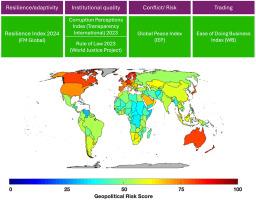指导国际可持续能源贸易的地缘政治风险指数
IF 5
Q2 ENERGY & FUELS
引用次数: 0
摘要
受供应链中断和地缘政治不稳定的影响,全球化石燃料市场波动较大。随着可再生能源产能的扩大和减排力度的加大,更具弹性和公平的交易结构对于避免类似的化石燃料市场脆弱性重演至关重要。本研究通过开发适合能源部门的地缘政治风险指数,支持电力燃料贸易的明智决策。该指数是通过对现有风险指标的结构化选择和评价来构建的。通过文献综述确定相关指标,并根据预定义的标准进行选择。选定的指数分为四个方面:弹性、制度质量、冲突和商业环境。由此产生的指数为评估地缘政治风险和评估能源贸易伙伴关系提供了定量工具。该指数应用于绿色电子燃料贸易,根据各国具体的生产潜力、需求和风险评分来评估交易量和成本。结果表明,欧洲北欧国家、新加坡、新西兰和加拿大是地缘政治上最可靠的合作伙伴,而容易发生冲突的国家得分最低。排除高风险合作伙伴只增加了1.7%的进口成本,但降低了供应风险。在不考虑风险的情况下,巴西、也门和几个撒哈拉以南国家主导了出口。应用风险评分排除了也门,增加了巴西、纳米比亚、安哥拉和秘鲁的出口份额。该指数与穆迪(Moody’s)的主权评级相关,表明它捕捉到了影响信用价值和贸易可靠性的更广泛因素。将地缘政治风险指数纳入能源贸易规划可以帮助政府和投资者减少对不稳定地区的风险敞口,增强供应安全,并促进更具弹性和可持续性的全球能源体系。本文章由计算机程序翻译,如有差异,请以英文原文为准。

Geopolitical risk index for guiding international sustainable energy trade
Global fossil fuel markets are volatile, influenced by supply chain disruptions and geopolitical instability. As renewable energy capacities expand and emission reduction efforts intensify, more resilient and equitable trading structures are critical to avoid reproducing similar fossil fuel market vulnerabilities. This study supports informed decision-making in electricity-based fuel trade by developing a Geopolitical Risk Index tailored to the energy sector. The index was constructed through a structured selection and evaluation of existing risk indicators. Relevant indices were identified via literature review and selected based on predefined criteria. Selected indices were categorised into four dimensions: resilience, institutional quality, conflicts, and business conditions. The resulting index provides a quantitative tool for assessing geopolitical risks and evaluating energy trade partnerships. Applied to green e-fuel trade, the index assesses traded volumes and costs based on country-specific production potentials, demand, and risk scores. Results indicate that the European Nordics, Singapore, New Zealand, and Canada are the most geopolitically reliable partners, while conflict-prone nations score lowest. Excluding high-risk partners increases import costs by only 1.7% but reduces supply risks. Without considering risks, Brazil, Yemen, and several sub-Saharan countries dominate exports. Applying risk scores eliminates Yemen and increases export shares from Brazil, Namibia, Angola, and Peru. The index correlates with Moody's sovereign ratings, suggesting it captures broader factors influencing both credit worthiness and trade reliability. Incorporating the Geopolitical Risk Index into energy trade planning can help governments and investors reduce exposure to unstable regions, enhance supply security, and promote a more resilient and sustainable global energy system.
求助全文
通过发布文献求助,成功后即可免费获取论文全文。
去求助

 求助内容:
求助内容: 应助结果提醒方式:
应助结果提醒方式:


